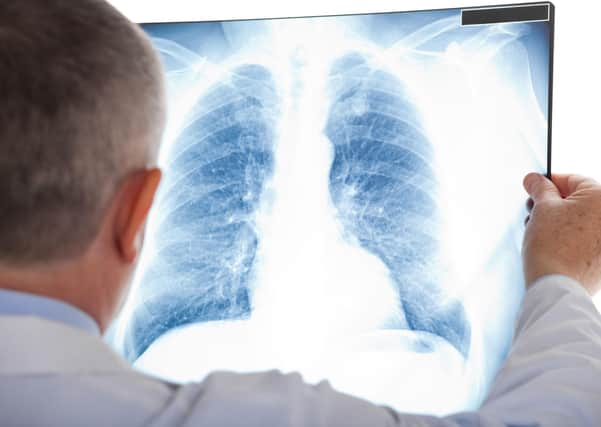How UK can become cancer care world leader – Chris Thomas


While Covid-19 did not cause the total ‘collapse’ initially feared, it did force the NHS to take unthinkable action. Cancer screening, diagnostics and treatments were all disrupted, delayed or cancelled at scale.
Advertisement
Hide AdAdvertisement
Hide AdNew Institute for Public Policy Research (IPPR) research shows just how severe the impact has been. Screening, referral, diagnostic and treatment activity were all significantly down in 2020, compared to 2019 levels. All said, 19,500 people are ‘missing’ a cancer diagnosis because of missed referrals, and it could now take until 2033 to clear the treatment backlog.


It’s important to be clear – this isn’t because of lockdowns, masks or vaccines. Those all protected the NHS, and just letting Covid-19 rip through the country would have led to a much more brutal health service collapse.
The real problem is that the NHS capacity was ruinously cut during the last decade and has not been properly restored in the last 18 months.
When Covid-19 reached these shores, the NHS had fewer staff, less money, fewer hospital beds and less technology than other countries. It had been stretched to breaking point. That’s why so much care was disrupted; why the backlog is so big; and why it will be so hard to get on track now, without bold investment, innovation and policy.
Advertisement
Hide AdAdvertisement
Hide AdThe Westminster government might point to their recent Health and Social Care Levy as a bold plan. Through this, the NHS will receive a little over £15bn extra in the next three years. The Prime Minister says this will make the NHS ‘the envy of the world’.


It’s nice rhetoric. But sadly, it just doesn’t match the reality. Earlier in September, the NHS Confederation and NHS Providers jointly said it would take twice this much money just to recover from Covid-19.
Even then, recovery to 2019 performance isn’t ambitious enough. That’s why IPPR is calling for an ambitious new pledge on cancer recovery, designed to both get us through the backlog today, and to achieve genuinely world-class cancer outcomes in the future.
The first component of that pledge must be building more capacity. This means more funding and more diagnostic machinery. It means urgent, mobile diagnostic units in places where the backlogs are worst. But perhaps most importantly, it should mean significant efforts to recruit and retain a sustainable, thriving cancer workforce.
Advertisement
Hide AdAdvertisement
Hide AdHospital beds, diagnostic equipment and clever technology are useless without healthcare professionals. But after a decade of severe overwork – compounded by policies like the 2012-17 public sector pay freeze – the cancer workforce faces a big shortfall. The Government should fund an increase in the seven most important cancer-related professions and go further to improve NHS pay and conditions to improve recruitment and retention.
The second part of that pledge should be to enable much more innovation. There are amazing medical discoveries that could transform cancer services – improving quality, while saving time and money. They need to be implemented, everywhere and for everyone. But, historically, the NHS has struggled to scale and spread innovation.
Luckily, that changed during Covid. A major crisis actively catalysed major changes – some that had eluded the health service for years. IPPR research shows that innovation is often blocked by a system that was reorientated during the austerity era to contain costs at all cost, rather than to maximise our health.
The final component is to better prevent people getting cancer. As many as four in 10 cancers can be prevented by better policies on tobacco, diet, weight and alcohol consumption.
Advertisement
Hide AdAdvertisement
Hide AdIn July 2020, the Government brought forward a new obesity strategy – including restrictions on junk food ads and promotions. It’s welcome, but it’s also one small step.
Now’s the time to go further. One option would be to tax those responsible for poor health – junk food and tobacco companies – and use that to fund healthy food subsidies and local tobacco control and stop smoking services.
This is a government that says its focused on ‘the people’s priorities’. There are few bigger priorities for the UK public than a thriving NHS and good cancer care. It’s time for the Government to do whatever it takes to recover, to build back better, and to genuinely lead the world on brilliant cancer care.
Chris Thomas is a senior research fellow at the think-tank the Institute for Public Policy Research (IPPR).
Advertisement
Hide AdAdvertisement
Hide AdSupport The Yorkshire Post and become a subscriber today. Your subscription will help us to continue to bring quality news to the people of Yorkshire. In return, you’ll see fewer ads on site, get free access to our app and receive exclusive members-only offers. Click here to subscribe.
Comment Guidelines
National World encourages reader discussion on our stories. User feedback, insights and back-and-forth exchanges add a rich layer of context to reporting. Please review our Community Guidelines before commenting.